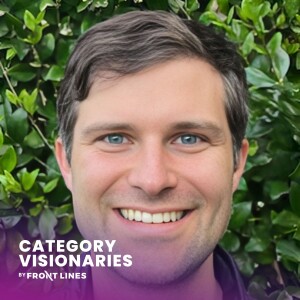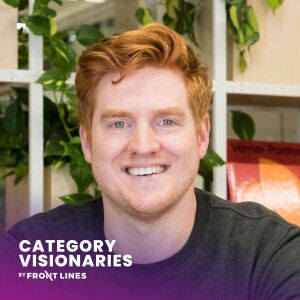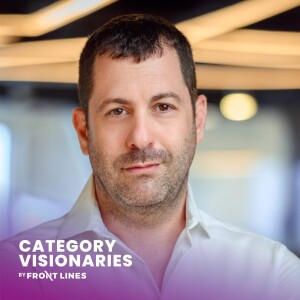BUILDERS
Welcome to BUILDERS — the show about how founders get new technology adopted.
Each episode features a founder on the front lines of bringing new tech to market, sharing how they broke into their industry, earned early believers, built credibility, and unlocked real technology adoption.
BUILDERS is part of a network of 20 industry-specific shows with a library of 1,200+ founder interviews conducted over the past three years.
For the full network, visit FrontLines.io.
Brought to you by:
www.FrontLines.io/FounderLedGrowth — Founder-led Growth as a Service. Launch your own podcast that drives thought leadership, demand, and most importantly, revenue.
Episodes

Wednesday Aug 28, 2024
Wednesday Aug 28, 2024
Welcome to another episode of Category Visionaries — the show that explores GTM stories from tech's most innovative B2B founders. In today's episode, we're speaking with John Kim, Co-Founder & CEO of Paraform, a recruiting platform that's raised $5 Million in funding.
Here are the most interesting points from our conversation:
Unplanned Fundraising Success: Paraform's $5 million seed round was closed in a single day, driven by the success of a key hire for a major client, which led to a warm introduction to investors.
Innovative Recruiting Marketplace: Paraform connects companies with specialized recruiters to fill difficult roles, leveraging the recruiters' deep networks and experience in niche areas.
Pivoting to Professional Recruiters: The company initially experimented with a bounty-based referral system but pivoted to a professional recruiter model to scale more effectively and align incentives better.
Effective Outbound Strategy: Paraform's growth is fueled by a strong outbound engine, inspired by Retool's operator playbook, which emphasizes quality in prospecting and targeted messaging.
Growth Metrics: The company has seen significant growth, including a 10x increase in revenue year-over-year and thousands of recruiters joining the platform, with 200+ companies served so far.
Future Vision: John envisions Paraform expanding globally, moving upmarket to serve larger enterprises, and diversifying its product lines and supply-side offerings beyond just recruiters.
//
Sponsors:
Front Lines — We help B2B tech companies launch, manage, and grow podcasts that drive demand, awareness, and thought leadership.
www.FrontLines.io
The Global Talent Co. — We help tech startups find, vet, hire, pay, and retain amazing marketing talent that costs 50-70% less than the US & Europe.
www.GlobalTalent.co

Wednesday Aug 28, 2024
Wednesday Aug 28, 2024
Welcome to another episode of Category Visionaries — the show that explores GTM stories from tech's most innovative B2B founders. In today's episode, we're speaking with Etrit Demaj, Co-Founder at KODE Labs, a real estate IoT platform that has raised $38 million.
Here are the most interesting points from our conversation:
The Early Vision for KODE Labs: Etrit and his co-founders saw a gap in the real estate market for a scalable, cloud-based operating system for smart buildings, which led to the founding of KODE Labs in 2017.
Bootstrapping and Belief: KODE Labs operated without outside capital until 2022, relying on the founders' belief in the transformative potential of cloud-based smart building platforms and their own financial resources.
Landing the Empire State Building as a Client: In 2022, KODE Labs secured the Empire State Building as a client, showcasing their platform's ability to meet the high standards of iconic properties committed to ESG and smart building initiatives.
Evolution of Go-to-Market Strategy: The company’s GTM approach evolved from a local focus to a regional and then national strategy, driven by initial success and feedback from their first 50 buildings.
Pioneering the Smart Building Category: KODE Labs is redefining the smart building category by transitioning what was traditionally on-premises to the cloud, making large-scale deployments globally feasible and cost-effective.
Building a Channel Partner Network: One of the most significant strategic decisions was creating a channel partner program, enabling global scalability through certified partners who can implement and build on the KODE Labs platform independently.
//
Sponsors:
Front Lines — We help B2B tech companies launch, manage, and grow podcasts that drive demand, awareness, and thought leadership.
www.FrontLines.io
The Global Talent Co. — We help tech startups find, vet, hire, pay, and retain amazing marketing talent that costs 50-70% less than the US & Europe.
www.GlobalTalent.co

Wednesday Aug 28, 2024
Wednesday Aug 28, 2024
Welcome to another episode of Category Visionaries — the show that explores GTM stories from tech's most innovative B2B founders. In today's episode, we're speaking with Michael Ioffe, CEO & Co-Founder of Arist, a message-based learning platform that has raised over $16 Million in funding.
Here are the most interesting points from our conversation:
Arist's Origin Story: Arist began as a solution to deliver education in war zones with limited internet and laptop access by leveraging text message-based learning, which later evolved into an enterprise solution.
Effective Learning Model: The company discovered that bite-sized, conversational learning delivered over time significantly improves retention and behavior change, compared to traditional methods like lengthy video courses.
The LMS Problem: Michael explains why traditional Learning Management Systems (LMS) are outdated, focusing on compliance rather than effective learning, and how Arist aims to meet learners where they are by integrating into tools like Slack and Microsoft Teams.
Targeting the Next-Gen Learning Leaders: Arist focuses on innovative L&D leaders who are open to modernizing corporate learning, rather than trying to convert legacy leaders resistant to change.
Fast Time-to-Value: Arist differentiates itself by offering a near-instant time-to-value, where potential clients can build and experience a course within 15 seconds, a stark contrast to the months-long implementation of traditional systems.
Future Vision for Learning: Michael envisions a future where 80% of Fortune 500 companies use Arist for the majority of their learning, moving away from static LMS systems to more dynamic, autonomous learning experiences.
//
Sponsors:
Front Lines — We help B2B tech companies launch, manage, and grow podcasts that drive demand, awareness, and thought leadership.
www.FrontLines.io
The Global Talent Co. — We help tech startups find, vet, hire, pay, and retain amazing marketing talent that costs 50-70% less than the US & Europe.
www.GlobalTalent.co

Wednesday Aug 28, 2024
Wednesday Aug 28, 2024
Welcome to another episode of Category Visionaries — the show that explores GTM stories from tech's most innovative B2B founders. In today's episode, we're speaking with Tuck Hauptfuhrer, CEO & Co-Founder of EarnBetter, an AI-powered job search platform that's raised $4.5 Million in funding.
Here are the most interesting points from our conversation:
Job Search Revolution: EarnBetter is leveraging AI to assist job seekers with resume writing, cover letter drafting, interview preparation, and job tracking—all for free. Tuck emphasizes that the job search is a challenging, unpaid task, and EarnBetter aims to ease this burden by providing comprehensive support.
Origin Story: The idea for EarnBetter was born out of Tuck's experience at Credit Karma, where he saw that financial struggles were often tied to career stagnation. The realization that most people navigate their job search alone inspired him to create a free, AI-powered platform to support job seekers.
Consumer Focus: Drawing from his experience at Credit Karma, Tuck underscores the importance of being consumer-centric. EarnBetter is committed to providing a 100% free service, driven by user feedback and focused on solving real problems for job seekers.
Manual Beginnings to AI Integration: Before any code was written, the EarnBetter team manually helped job seekers to validate their approach. The introduction of generative AI has since accelerated their ability to automate these processes, but the mission to provide free, comprehensive job search support remains unchanged.
Business Model Innovation: EarnBetter's business model mirrors the win-win approach seen at Credit Karma. The platform remains free for job seekers, while employers pay for access to qualified candidates. This model supports the company's commitment to offering free services, which sets them apart from competitors.
Future Vision: Tuck envisions EarnBetter not just as a job search tool, but as a long-term career partner. The goal is to build a marketplace that enhances the hiring process for both employers and job seekers, raising the industry standard for support provided to job seekers.
//
Sponsors:
Front Lines — We help B2B tech companies launch, manage, and grow podcasts that drive demand, awareness, and thought leadership.
www.FrontLines.io
The Global Talent Co. — We help tech startups find, vet, hire, pay, and retain amazing marketing talent that costs 50-70% less than the US & Europe.
www.GlobalTalent.co

Wednesday Aug 28, 2024
Wednesday Aug 28, 2024
Welcome to another episode of Category Visionaries — the show that explores GTM stories from tech's most innovative B2B founders. In today's episode, we're speaking with Adam Weinstein, CEO & Co-Founder at Writ, a Business Intelligence platform that has raised $3.8 Million in funding.
Here are the most interesting points from our conversation:
BI Market Positioning: Adam discusses how Writ operates in the BI market, focusing on the divide between operational reporting and traditional enterprise-governed dashboards.
Category Creation in BI: Writ is navigating the BI market with the intention of making "operational reporting" a more prominent category, even though it's not yet widely recognized.
Strategic Labeling: Despite aspirations to differentiate, Adam acknowledges that labeling Writ within the BI market is necessary for attracting investment, as that’s where the money currently flows.
Future of Operational Reporting: Adam shares plans to make "operational reporting" a more recognized and valued concept within the BI landscape, potentially creating a new subcategory.
Balancing Innovation and Market Expectations: Adam touches on the challenges of balancing innovative ideas with market realities, especially when communicating value to potential investors.
Market Strategy Evolution: Adam hints at Writ's evolving market strategy, suggesting that the current BI market positioning might shift as the company grows and the category of operational reporting gains traction.
//
Sponsors:
Front Lines — We help B2B tech companies launch, manage, and grow podcasts that drive demand, awareness, and thought leadership.
www.FrontLines.io
The Global Talent Co. — We help tech startups find, vet, hire, pay, and retain amazing marketing talent that costs 50-70% less than the US & Europe.
www.GlobalTalent.co

Tuesday Aug 27, 2024
Tuesday Aug 27, 2024
Welcome to another episode of Category Visionaries — the show that explores GTM stories from tech's most innovative B2B founders. In today's episode, we're speaking with Barb Hyman, CEO & Founder of Sapia AI, a recruiting technology platform that's raised over $21 Million in funding.
Here are the most interesting points from our conversation:
Revolutionizing Hiring: Sapia AI leverages natural language processing (NLP) to create an engaging, efficient, and bias-free hiring process, replacing traditional resumes with AI-driven candidate assessments.
Impact of AI Adoption: The rise of AI, particularly after November 2022, has significantly accelerated interest in Sapia’s technology, although the company has been pioneering AI-driven hiring since 2018.
Navigating Category Creation: Sapia AI is a new category called "Smart Interviewer," but the challenge has been in positioning it within existing HR tech categories. The focus is now on customer storytelling to convey its unique value.
Empathy in Enterprise Sales: Barb emphasizes the importance of "enterprise empathy" when selling AI into HR, recognizing the significant change management required and celebrating success only when the customer does.
Candidate Experience as a Marketing Tool: The virality of Sapia AI’s candidate experience has led to organic growth, with candidates often referring the product to key decision-makers within organizations.
Global Expansion Strategy: Sapia AI has strategically focused on the EMEA market due to its sophisticated approach to AI regulation and the high demand for inclusive, bias-free hiring processes.
//
Sponsors:
Front Lines — We help B2B tech companies launch, manage, and grow podcasts that drive demand, awareness, and thought leadership.
www.FrontLines.io
The Global Talent Co. — We help tech startups find, vet, hire, pay, and retain amazing marketing talent that costs 50-70% less than the US & Europe.
www.GlobalTalent.co

Tuesday Aug 27, 2024
Tuesday Aug 27, 2024
Welcome to another episode of Category Visionaries — the show that explores GTM stories from tech's most innovative B2B founders. In today's episode, we're speaking with Siadhal Magos, CEO & Co-Founder of Metaview, an AI assistant for hiring that has raised over $14 Million in funding.
Here are the most interesting points from our conversation:
Founding Insight: Siadhal and his co-founders recognized that crucial hiring data was locked in interview conversations, leading them to create Metaview to capture and analyze this data for better hiring decisions.
Evolving the Solution: Although the problem has remained consistent since 2018, advances in AI and LLMs have significantly enhanced Metaview’s ability to provide actionable insights from interview data, making the product more valuable.
Challenges in Adoption: While the product concept is widely accepted, adoption can be slowed by multi-stakeholder sales processes and competing internal priorities within target organizations.
Bottoms-Up Go-To-Market Strategy: Metaview’s initial focus was on tech companies similar to those the founders had worked at. As the product evolved, the target market broadened, allowing for a bottoms-up approach that leverages direct end-user engagement.
Founder-Led Marketing: Siadhal attributes the success of their marketing efforts, particularly on social media, to authentic and knowledgeable communication directly from the founder, focusing on topics where he holds true expertise.
Creating a New Line Item: Metaview often requires customers to create a new software line item in their budgets, which is justified by the product’s significant ROI—saving recruiters six to ten hours per week.
//
Sponsors:
Front Lines — We help B2B tech companies launch, manage, and grow podcasts that drive demand, awareness, and thought leadership.
www.FrontLines.io
The Global Talent Co. — We help tech startups find, vet, hire, pay, and retain amazing marketing talent that costs 50-70% less than the US & Europe.
www.GlobalTalent.co

Tuesday Aug 27, 2024
Tuesday Aug 27, 2024
Welcome to another episode of Category Visionaries — the show that explores GTM stories from tech's most innovative B2B founders. In today's episode, we're speaking with Sandeep Ahuja, CEO of Covetool, a sustainable design platform that has raised over $36 Million in funding.
Here are the most interesting points from our conversation:
Transforming Building Design with AI: Covetool is revolutionizing the architecture, engineering, and construction space by integrating AI with credentialed expertise to enhance building design processes, making them faster, cheaper, and more sustainable.
From Services to Software to AI-Powered Services: Sandeep discusses the company's journey from a service-based business to a software platform and now to a combination of software and AI-powered services, enabling scalability and greater impact.
Hyper-Targeted Marketing Strategies: Covetool’s go-to-market strategy is highly data-driven, focusing on content and engagement within specific micro-communities, like targeting principal architects in California with tailored messages about local energy codes.
Importance of Letting Experts Lead: Sandeep emphasizes the value of trusting and empowering team members, even when it means stepping back and allowing them to make decisions that might initially feel counterintuitive.
Iterative Learning from Customer Feedback: By actively listening to customer calls, Sandeep identified a significant market shift—from users wanting software to preferring comprehensive services—which led to the pivot towards offering “value as a service” (VaaS).
Building Industry Disruption: Covetool is positioned to disrupt the traditional building design process by offering a lower-cost, more efficient alternative to traditional consultants, aiming to be the go-to design professional for buildings across North America.
//
Sponsors:
Front Lines — We help B2B tech companies launch, manage, and grow podcasts that drive demand, awareness, and thought leadership.
www.FrontLines.io
The Global Talent Co. — We help tech startups find, vet, hire, pay, and retain amazing marketing talent that costs 50-70% less than the US & Europe.
www.GlobalTalent.co

Tuesday Aug 27, 2024
Tuesday Aug 27, 2024
Welcome to another episode of Category Visionaries — the show that explores GTM stories from tech's most innovative B2B founders. In today's episode, we're speaking with Fabricio Miranda, CEO & Co-Founder of Flieber, an inventory management platform that has raised over $19 Million in funding.
Here are the most interesting points from our conversation:
Transition from Service-Led to Product-Led Growth: Flieber’s initial sales-led approach, heavily reliant on human operation, proved inefficient. A pivotal shift to a product-led growth strategy, with a self-serve platform, significantly improved scalability and product quality.
Identifying the Ideal ICP: Through trial and error, Fabricio identified the sweet spot for Flieber’s target market—e-commerce brands with $2 to $50 million in revenue, where inventory issues are significant, but legacy systems do not yet complicate integrations.
Content as a Growth Engine: Fabricio emphasizes the importance of inbound marketing through high-quality, non-salesy content that educates the market on inventory planning, positioning Flieber as a thought leader rather than just a product.
Challenges of Fundraising: Although Flieber’s fundraising was relatively easy, Fabricio reflects on the downsides of raising too much capital too early, which led to over-expansion and a loss of agility.
Vision for the Future: Fabricio envisions a future where Excel spreadsheets are no longer the standard for inventory management, advocating for the broader adoption of specialized inventory planning platforms like Flieber.
Building a Partnerships Strategy: Moving forward, Fabricio is focused on building strong partnerships, particularly with agencies that can introduce and integrate Flieber’s platform with their clients, expanding the platform’s reach.
//
Sponsors:
Front Lines — We help B2B tech companies launch, manage, and grow podcasts that drive demand, awareness, and thought leadership.
www.FrontLines.io
The Global Talent Co. — We help tech startups find, vet, hire, pay, and retain amazing marketing talent that costs 50-70% less than the US & Europe.
www.GlobalTalent.co

Tuesday Aug 27, 2024
Tuesday Aug 27, 2024
Welcome to another episode of Category Visionaries — the show that explores GTM stories from tech's most innovative B2B founders. In today's episode, we're speaking with Nadav Arbel, CEO & Co-Founder of Cyrebro, an ML-backed MDR platform that has raised $51 Million in funding.
Here are the most interesting points from our conversation
Vision for Cyrebro: Nadav discusses how Cyrebro is transforming the cybersecurity landscape with a unique, cloud-based approach to Managed Detection and Response (MDR), integrating AI and machine learning to provide comprehensive threat detection.
The Journey to $51M Funding: He shares insights into Cyrebro's fundraising journey, emphasizing the importance of strategic alignment with investors who understand and support their long-term vision.
Importance of AI in Cybersecurity: Nadav explains how the use of AI and machine learning is critical in staying ahead of evolving cyber threats, making their platform not just reactive but predictive.
Building a Category: He talks about the challenges and strategies involved in creating a new category within the crowded cybersecurity market, focusing on differentiation and market education.
GTM Strategy: Nadav outlines Cyrebro’s go-to-market strategy, including their focus on partnerships and integrations to scale rapidly and effectively in a competitive environment.
Customer-Centric Approach: He highlights the importance of understanding customer pain points and building solutions that directly address those needs, which has been central to Cyrebro's success.
//
Sponsors:
Front Lines — We help B2B tech companies launch, manage, and grow podcasts that drive demand, awareness, and thought leadership.
www.FrontLines.io
The Global Talent Co. — We help tech startups find, vet, hire, pay, and retain amazing marketing talent that costs 50-70% less than the US & Europe.
www.GlobalTalent.co


